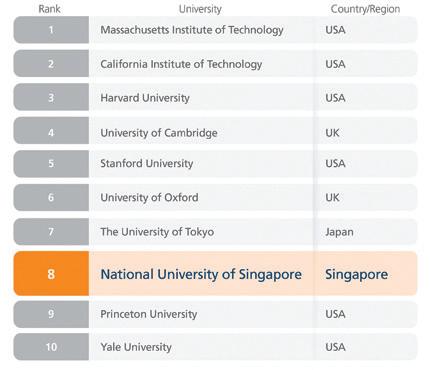
4 minute read
NUS Graduates Ranked 8th Most Employable Worldwide
NUS graduates across diverse fields have been recognised as eighth in the world by international employers in the 2022-2023 Global Employability University Ranking and Survey.
NUS GRADUATES WERE RANKED THE EIGHTH MOST EMPLOYABLE IN THE WORLD BY
RECRUITERS, rising up one notch from last year, according to the 2022-2023 Global Employability University Ranking and Survey results.
NUS also retained its position among the top two in Asia – behind only the University of Tokyo at seventh place – and maintained its spot as the only Singapore university in the top 10. This is the third year in a row that NUS has emerged in the top 10 of the ranking.
Produced by the Paris-based HR consultancy Emerging and published by Times Higher Education, the ranking lists the top 250 universities according to graduate employability based on the views of international recruiters. The universities were assessed on six key drivers identified by businesses as the main contributors to creating employable graduates: academic excellence, internationality, digital performance, focus on work expertise, graduate skills and specialisation.
“We are delighted that NUS graduates across diverse fields have been recognised as eighth in the world by employers in Singapore and globally. It is a testament to the talented students we receive at NUS, and the quality of our professors and programmes,” said an NUS spokesperson.
“With global turmoil and a tightening job situation in the time ahead, the University will strive to ensure that our graduates continue to be grounded in broad-based, interdisciplinary and lifelong learning, to help them stand out and thrive in a constantly evolving workplace.”
Ms Sandrine Belloc, Emerging’s Managing Partner, called NUS’ results in this year’s list an “incredible performance”. She noted that the University had swiftly risen up in the ranking over the past decade, moving from 49th place in 2013 to ninth just seven years later in 2020. She added that the University had been rated particularly well in internationality, which considers a university’s international reputation, its international staff and curriculum, and share of international students.
Now in its 12th year, the survey gathered 98,014 votes from participating employers worldwide on which universities taught the key skills that students need to thrive in the workplace.
Employers who took part provided around 800,000 graduate jobs or placements in 2022-2023 in total. Respondents of the survey were corporate managers from 24 countries who recruited and/or supervised more than five graduates a year.
Findings from this year’s results showed that digital skills – measured under the graduate skills component – have become the most important factor to employers since the COVID-19 pandemic. The two other key employability drivers regarded as important by recruiters were subject specialisation and work expertise.
“Today, 92 per cent of respondents to the survey believe universities should do more to increase digital skills. Digital skills are not the exclusive concern anymore of computer science faculties and their students. Any university digital plan needs a transversal approach that includes all stakeholders,” said Ms Belloc in a press release.
STAYING AHEAD WITH RELEVANT SKILLS
To equip students with the relevant skills to stay ahead in an increasingly digitalised world that has transformed the work environment, NUS had enhanced its General Education curriculum for students admitted from AY2021-22 to include both Data Literacy and Digital Literacy as part of its six key pillars of knowledge under the curriculum.
In recognition of the importance of a holistic education, the University also offers students global exposure through study-abroad programmes with over 300 partner universities in more than 40 countries. Students can also gain valuable real-world experience through internships at start-ups in entrepreneurial hotspots around the world under the NUS Overseas Colleges programme. As part of the NUS Centre for Future-ready Graduates (NUS CFG) Global Industry Insights programme, students can explore emerging and growth trends across industries by heading overseas to places like Thailand and Indonesia to learn about regional businesses and engage with industry professionals.
To boost the future readiness of NUS students and graduates, the University launched two new digital platforms – the Internship-As-A-Service (IAAS) and conNectUS in January this year. Led by NUS CFG and NUS Enterprise, IAAS is a platform that enables students to take on curated short-stint projects of flexible duration with local and overseas companies whether during the semester or vacations, with all projects recognised as internships. Meanwhile, conNectUS is the University’s professional networking platform that allows NUS students and alumni to connect, exchange career insights and tap into the hidden job market.
NUS CFG also holds career fairs to provide students engagement opportunities with industry players across diverse sectors. Other than large-scale signature fairs like the NUS Career Fest, Internship Day and Postgraduate Career Fair, this includes the inaugural College of Humanities and Sciences (CHS) Navigator and College of Design and Engineering (CDE) Career Fair, both the result of close collaboration with each college.
TOP 10 UNIVERSITIES
GLOBAL EMPLOYABILITY UNIVERSITY RANKING AND SURVEY 2022-2023

Source: GEURS










